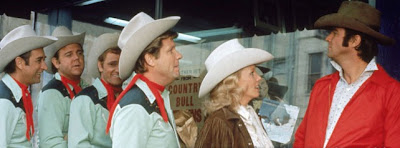
Good old boy Burt Reynolds with (from left) Don Williams, Rick Hurst, Jerry Reed, James Hampton and Conny Van Dyke in John G. Avildsen's delightful "W.W. and the Dixie Dancekings" (1975)I miss Burt Reynolds movies the same way I miss Doris Day films.
Both stars made me feel good - but not in the hackneyed "feel-good" way. They made me happy. They were both good company.
Reynolds' career as a major movie star was sadly fleeting, reminding me of Ernest Dowson's haunting poem, "They Are Not Long":
"They are not long, the weeping and the laughter,
Love and desire and hate:
I think they have no portion in us after
We pass the gate.
They are not long, the days of wine and roses:
Out of a misty dream
Our path emerges for awhile, then closes
Within a dream."
Burt's star shone all-too-briefly and then seemed to close within a dream. He reigned in the 1970s, during which he defined his star persona - part scamp, part playboy - largely on Johnny Carson's couch on "The Tonight Show" (which is where we really got to know him), while he worked hard to stretch himself as a film actor in a series of features for good directors which, in retrospect, now seem impressively varied and ambitious.
I can't think of another actor of his magnitude who was so nakedly sincere about improving himself. Burt Reynolds was a student of film, perhaps the only studio-system actor to operate without a studio. He arrived too late. Actually, Burt was born too late. The studio system was long dead when he came on the scene. I've a strong hunch that Jack Warner, Darryl F. Zanuck and Harry Cohn would have loved him.
All of this is in premable to celebrating the Fox Movie Channel's screening - at 4:30 p.m. on May 19th - of Burt's charming and difficult-to-see "W.W. and the Dixie Dancekings," one of four titles he made in 1975.

The movie year 1975 is memorable for such titles as Steven Spielberg's "Jaws," Robert Altman's "Nashville" and Stanley Kubrick's "Barry Lyndon," among others, but beyond those classics were the four that Burt made. In addition to John G. Avildsen's "Dancekings," there are Robert Aldrich's "Hustle," Stanley Donen's "Lucky Lady" and my beloved "At Long Last Love," directed by Peter Bogdanovich.
On paper, these all looked great - they still do - but in reality... Well, who remembers or cares about any of them? Well, I do (he says defiantly).
I've written here at length about "At Long Last Love" (and on two occasions); the bracing "Hustle" has a small cult of supporters who compare it to the work of Jean-Pierre Melville; and "Lucky Lady" was undermined when Fox decided the dark tone of its original ending (truly poignant and the point of the movie) was too disturbing and reshot it.
Of these four, "W.W. and the Dixie Dancekings" is the tiniest - a sour-mash-flavored road film about a rickety country-western group with a pleasing sound and its shady, incorrigible manager, W.W. Bright (Burt natch). Ned Beatty is the piece's well-fed villain; the appealing Conny Van Dyke (who made Phil Karlson's terrific "Framed" the same year and then seemingly dropped out of sight) is the female lead, and the supporting cast includes such female stalwarts as Louise Latham (uncredited), Peg Murray, Polly Holliday, Nancy Andrews, as well as James Hampton, Burt's pal, the late Jerry Reed, and, in an amusing cameo, Art Carney.
But it's Burt's film. He's light and appealing - grinning, blowing bubble gum and generally flirting with everyone in sight, men as well as woman.
For a long time, "W.W. and the Dixie Dancekings," almost impossible to see, seemed like a dream. Elusive. Now, thanks to the Fox Movie Channel, it's back at least one more time to be enjoyed.
My recorder is ready.
No comments:
Post a Comment